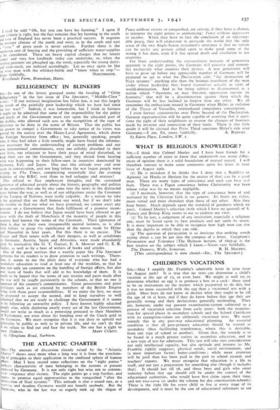WHAT IS RELIGIOUS KNOWLEDGE ?
SIR,—I think that Colonel Mozley and I have been friends for a sufficient number of years to know that underneath our many differ- ences of opinion there is a solid foundation of mutual regard. I will therefore venture to make some comments upon his letter in your issue of August 29th.
(t) He is mistaken if he thinks that I deny that a Buddhist or Agnostic (or Hindu or Moslem for the matter of that) can be a good man. There are many types of conscience and each can bear real fruit. There was a Pagan conscience before Christianity was born whose value was by no means negligible.
(2) I maintain, however, that the type of conscience born of and nurtured by the Christian faith is sui generis. Its fruits are richer, more varied and more abundant than those of any other. Also they keep better. Much depends upon the standard of goodness which we erect. Colonel Mozley's selection (with which I have no quarrel) of S. Francis and Bishop King seems to me to endorse my view.
(3) To be just, a judgement of any institution, especially a religious one, must be based upon its best products and not upon its worst. It is more important to be able to recognise how high men can rise than the depths to which they can sink.
(4) The question of persecution is so intricate that nothing worth saying about 1, can be got into the compass of a letter. Creighton's Persecution and Tolerance (The Hulsean lectures of 1893-4) is the best treatise on the subject which I know.—Yours very faithfully,


























 Previous page
Previous page